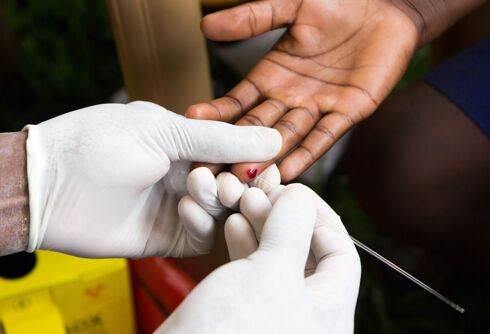The Biden administration is seeking to drastically increase funds to “help accelerate and strengthen efforts to end the HIV/AIDS epidemic,” a introductory budget proposal submitted to the Senate Appropriations Committee reveals.
The Executive Office of Management and Budget (OMB) submitted the president’s initial discretionary budget request, known as a “skinny budget,” which previews exactly how much funds the White House will ask for their executive departments for fiscal year 2022. They are seeking to increase to what the Trump administration allotted to HIV/AIDS prevention by nearly two-fifths of previous funds.
Related: How strongly does President Biden support LGBTQ rights? We asked the man who knows best.
In the budget, the “Ending the HIV Epidemic” program will get an additional $267 million, its first increase since it was started in 2019 under the Trump administration. The initiative under the oversight of the Health and Human Services Department (HHS) would have a budget of $670 million instead of the $403 million it has been allotted since its start. That is an increase of almost 40 percent.
Never Miss a Beat
Subscribe to our newsletter to stay ahead of the latest LGBTQ+ political news and insights.
“Investing in Public Health” is a key component of Biden’s budget proposal, and the memo outlining the eventual proposal reaffirms that the White House “commits to ending the HIV/AIDS epidemic.”
“To help accelerate and strengthen efforts to end the HIV/AIDS epidemic in the United States, the discretionary request includes $670 million within HHS to help aggressively reduce new HIV cases while increasing access to treatment, expanding the use of pre-exposure prophylaxis [PrEP], and ensuring equitable access to services and supports,” the OMB outline declares.
Under the guidance of Biden’s Health and Human Services Secretary Xavier Becerra, the additional funds would go to the Centers for Disease Control and Prevention (CDC), the Health Resources and Services Administration (HRSA), the Indian Health Service (IHS), and the National Institute for Health (NIH), who would put them toward initiatives that “aim to reduce new HIV cases aggressively.”
Overall, the White House has a discretionary budget appropriated by Congress every year, including two major components: defense spending and non-defense spending. For his first full fiscal year, Biden will propose a major increase in non-defense funding, and a minimal change in defense spending.
$769 billion is being asked for in non-defense funds, which would be a nearly 16 percent increase from the fiscal year 2021 budget, proposed and passed under the Trump administration last year. $753 billion would go to national defense programs, which is less than a two percent increase, according to Acting OMB Director Shalanda D. Young’s memo to Senate Appropriations Committee members.
Biden is seeking an increase to the budget allotted for the HHS Department by about 23 percent.
The Trump administration sought to decrease new HIV infections by a rate of 90 percent in the United States by 2030, and Biden declared during his campaign that he wanted to end the domestic HIV epidemic by 2025, according to the Washington Blade.
“While it falls short of what the community has requested, if this funding is realized, it will continue the momentum already created and make further progress in ending HIV in the U.S.,” HIV+Hepatitis Policy Institute Carl Schmid said to the Blade. “Efforts to end HIV will help eradicate an infectious disease that we have been battling for the last 40 years and help correct racial and health inequities in our nation.”
The Biden calls for an $118 billion increase in discretionary spending overall, about a 8.4 percent increase compared to the 2021 fiscal year budget.
Editor’s note: A previous version of this article incorrectly state that the Trump administration sought to increase – not decrease – new HIV infections by a rate of 90 percent in the United States by 2030. We regret the error.
Don't forget to share:















